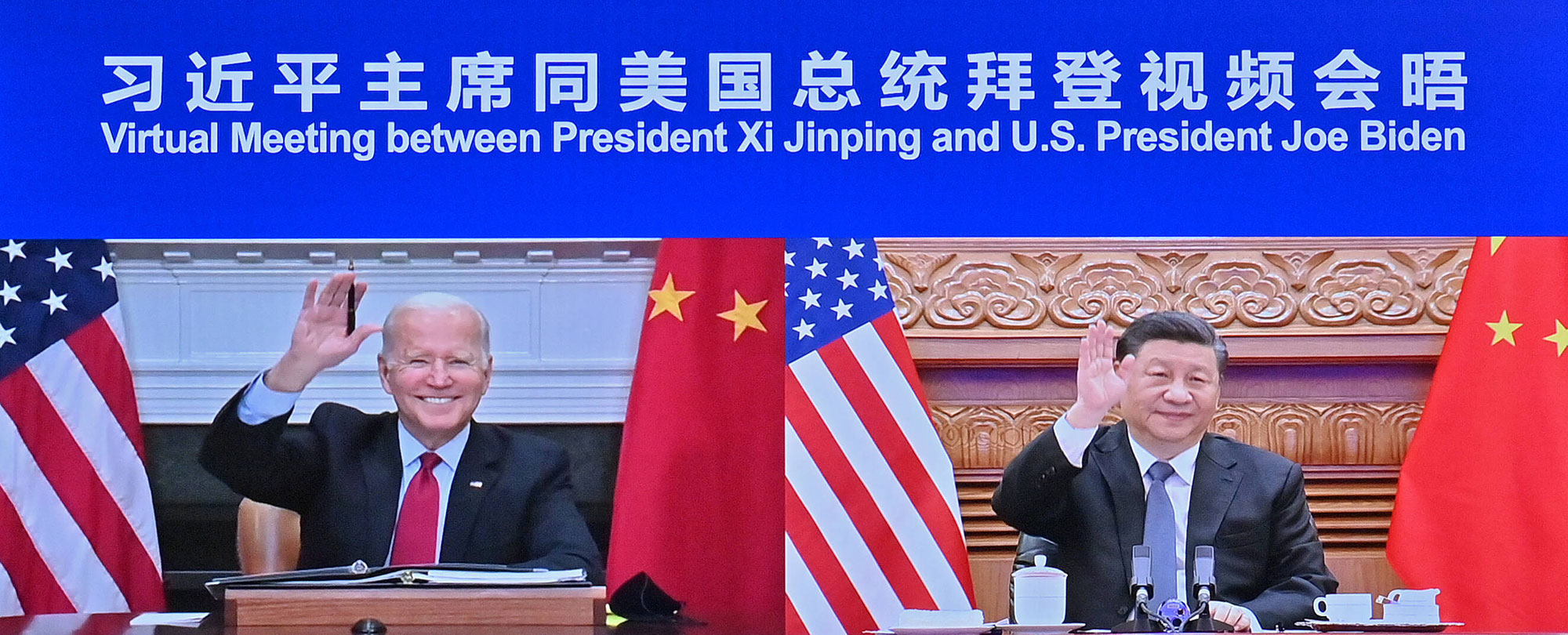Professor Weigelin-Schwiedrzik discusses the November 2021 virtual-summit between the Presidents of the two superpowers: President Joe Biden and President Xi Jinping. It took place in a cordial atmosphere. The summit showed the two great powers in need of each other, and the two Presidents in need of a boost which they hoped would be generated from their meeting.
Susanne Weigelin-Schwiedrzik
29 October 2021
Chinese version
President Biden and President Xi Jinping had a virtual summit lasting for more than three hours on Tuesday, November 16, 2021. Because of the recent upsurge in Corona cases, Europe has not really taken notice of the event. This is very unfortunate as the summit marks a major milestone in recovering from a downward spiral in Sino-US relations.
After President Biden’s current moves to build an anti-China alliance in the Indo-Pacific region and China’s aggressiveness along the Taiwan straits, most observers did not anticipate the cordiality displayed by the two presidents. Even minutes before the conversation started, the White House spokesperson responded to journalists in a way which caused no one to hope for an easing of tensions.
A week earlier, however, national security adviser Jake Sullivan had already introduced a new tone into Sino-US relations. During an interview with CNN’s Fareed Zakaria, he surprisingly explained that the US had made a major mistake in the past when thinking that US policy could bring about a fundamental transformation of China. The goal of the Biden administration, according to Sullivan, was to co-exist with China in a way that was favorable to the US, its values and its position in the international system. Rather than hoping for change in China, the US administration wants China to shoulder its share of responsibility as a major power. During the virtual summit, the same idea was expressed by President Biden. He stressed that the aim of the meeting was to avoid the inevitable competition between the US and China evolving into a conflict and to manage not only a bilateral relationship but a great power relationship of relevance for the world at large.
The implications of this new tone in Sino-US relations are not to be underestimated. They imply a fundamental departure from the value-based approach to China which US Democrats advocated for a long time and which the EU is still propagating as the right way to deal with China. It also implies that the US fulfills a wish that many diplomats in China have held for a long time: that the US would acknowledge China as equal and share responsibility for the world with China. President Biden hopes to win President Xi Jinping to accept a world in which both great powers can coexist and agree on the terms of their co-existence. Xi Jinping hopes that the US acknowledges China as a responsible world power.
Interestingly, the Sullivan interview took place on the first day of the 6th Plenary Session of the 19th Central Committee of the CCP, a major CCPCC session before the upcoming 20th Party Congress next year. During the meeting, the CCPCC passed a resolution on the history of the Party which most observers expected to be yet another milestone in consolidating Xi Jinping’s power over the Party. As it turns out, the expectations were wrong. In the party resolution, there is a lot of Xi-Jinping-talk, but it also shows that Xi can no longer be regarded as the uncontested leader of the CCP. The resolution does not conceal that there are many voices inside the CCP and that some of these voices are strong enough to disturb Xi’s plans for uncontested leadership.
Joe Biden is also struggling to make his plans for a re-strengthening of the US come true. He has not yet fulfilled many of the hopes his supporters inside and outside the US have, and what he has achieved so far leaves him with less support and more criticism than at the beginning of his tenure. He needs to show that he can handle the difficult relationship with China adequately, and keep channels of dialogue open on the basis of realistically assessing China’s strengths and weaknesses.
The unexpected cordiality displayed during the summit did not convince everybody on each side. While the “Global Times”, known for its wolf diplomacy, stressed that Xi was the winner of the summit as he put China into the position of defining the rules of the game for the further development of US-China relations, Biden was accused in US media for capitulating to Xi and for not accusing China for its human rights violations and unfair terms of trade. On both sides, it seems difficult to accept that the US cannot dominate the world without China, and China does not yet have the strength to take over leadership from the US.
The recent virtual summit showed the two great powers in need of each other, and the two Presidents in need of a boost which they hoped would be generated from their meeting. The fact that media reaction was less than expected shows that this was only the beginning of what it is hoped will evolve into a process of defining mechanisms of conflict avoidance and possible cooperation.





